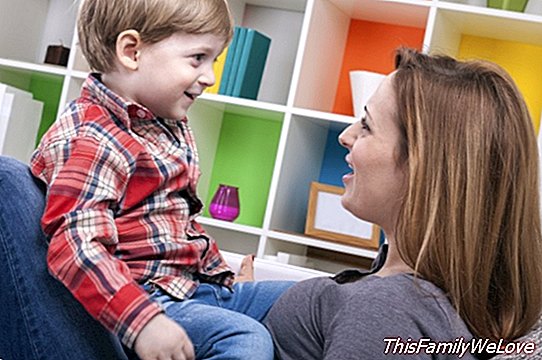How to ask children to avoid responding with monosyllables

The communication with children It's not always easy, and sometimes when we ask they usually respond with monosyllables, trying to end the conversation. It does not matter if we ask them how is the school? or if they liked the movie they've seen? They usually respond with a yes or no, and in the best case with a good, bad, good, ... In any case, it is difficult to get more words out.
Many parents complain that when they try to talk to their children, sometimes they seem absent, they are in their world or they build a communicative barrier with adults. So, how to ask children to avoid responding in monosyllables.
The axis of conversations with children
Having a conversation with a child can be complicated, but it is very important to encourage it, since through communication we strengthen ties and create a positive family atmosphere that allows us to know and understand each other. Although it is true that communicating with children can be complicated, we can learn to have conversations with our children in a more fluid way and that involve real communication.
Children tend to be very schematic in the dialogue and some show difficulties in expressing correctly what they think or feel. So parents should keep in mind that the mood of our conversation should always be positive, if we want it to last, because positive questions help to continue the conversation. Also, if we want more comments on a topic, it is convenient to enter numbers in our questions such as: "What three friends of your class do you like the most ?, and avoid emotionally charged adjectives such as sad, hateful ... They could stop the dialogue.
How to ask children to avoid responding with monosyllables
To avoid being answered by resorting to monosyllable relief, the trick is to ask open questions, which usually have infinite answers. However, we can also resort to other tips with which we will improve our communication skills to get closer to children and learn to communicate as a family.
1. Encourages communication with the family and make it a habit. This familiar custom that we can all enjoy is the first step. It is not about constantly talking, as it could be heavy and overwhelming, but it can favor certain moments of communication and dialogue. With some habits as simple as removing the television while we eat so we can talk and tell us about the day we can favor it. It is about looking for a moment a day for communication and at that moment free us of electronic devices (television, phones, tablet, etc.). We are often in family. but without paying attention to each other, our example in this sense is the first step.
2. Look at your children and actively listen to them when they tell you something. Sometimes we are so involved in our things that when we speak we are doing other tasks. It is important that they perceive that in speaking they receive our attention.
3. Avoid closed questions, that can be answered with a yes or a no. Instead of asking, How about the exam? We can ask, What did you ask in the exam? Or instead of asking, What's up with the school? We can ask what have you done in school today? Open-ended questions help children use their critical thinking skills to identify concepts, while they can analyze why they feel this way or that according to their value system. In this way, they offer a multitude of answers that must be organized with a sentence. If we change our way of asking, we can change the way we respond.
4. Talk to them and tell them how your day is. Communication consists of an exchange and you should not focus on them. Tell them your things and remember to be effusive, and even consider their opinion about what you tell them.
5. Respect what they tell you and listen to them. Often, we complain that they respond with monosyllables, but when what they tell us we do not like, we tend to judge, criticize, and disrespect. If we want to be spoken to, we will have to respect their points of view and what they tell us.
6. Ask them about their emotions. For example, how did you feel when they gave you the note? How did you feel about that reaction of your partner? Etc.
7. Let them see that you understand them and that what they tell you is important to you. Use phrases like "I understand you ..." "It's logical that you feel this way ...", etc.
8. Let them express themselves freely.
Celia Rodríguez Ruiz. Clinical health psychologist, specialist in Child and Adolescent Psychology and Pedagogy. Director of Educa and Learn.




